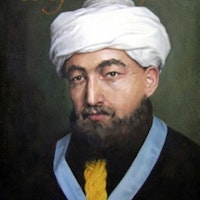Accept the Truth
Topic: Truth, Law, & Principle
Know, however, that the ideas presented in these chapters and in the following commentary are not of my own invention; neither did I think out the explanations contained therein, but I have gleaned them from the words of the wise occurring in the Midrashim, in the Talmud, and in other of their works, as well as from the words of the philosophers, ancient and recent, and also from the works of various authors, as one should accept the truth from whatever source it proceeds.
Moses Maimonides, born around 1135 or 1138 in Córdoba, Spain, was a prominent figure in Jewish history, known for his roles as a rabbi, physician, and philosopher. The political turmoil of his time, marked by the rise of the Almohads, an Islamic sect, forced Maimonides and his family to relocate first to Morocco and then to Palestine, before finally settling in Egypt. In Egypt, he served as a court physician to Sultan Saladin, balancing his medical duties with his scholarly pursuits.
Maimonides' scholarly work is notable for its breadth and depth. He wrote extensively on Jewish law and philosophy, with his major works including a commentary on the Mishnah and the comprehensive Code of Law. His philosophical treatise, "Guide for the Perplexed," remains his most influential work, attempting to reconcile Aristotelian philosophy with Jewish theology. This work reflects his commitment to intellectual inquiry and rational thought in religious understanding.
Beyond his scholarly achievements, Maimonides was also a community leader and practitioner. His life in Egypt was not only about his intellectual work; he was actively involved in caring for the physical and spiritual needs of his community. This dual role of scholar and practitioner illustrated his approach to life, where intellectual pursuits were balanced with practical responsibilities. His influence extended beyond the Jewish community, earning him respect and recognition in broader circles. Maimonides' life and work, rooted in his time and place, continue to be studied for their contributions to religious scholarship and practical philosophy.
Shemonah Perakim
Maimonides, Moses. Foreword to The Eight Chapters Of Maimonides On Ethics (Shemonah perakim), translated by Joseph I. Gorfinkle, Ph.D. Columbia University Press, New York (1912). Page 35-36.

Moses Maimonides
Theme: Truth


About This Moses Maimonides Quotation [Commentary]
Moses Maimonides’ statement, “one should accept the truth from whatever source it proceeds,” is not an abstract principle but a lived method. In the surrounding passage, he writes that the ideas in his work are “not of my own invention,” but “gleaned…from the words of the wise” in the Midrashim and Talmud, from “the philosophers, ancient and recent,” and from “the works of various authors.” His approach does not favor a single tradition or authority but emphasizes the content of a teaching. He offers this acknowledgment at the outset, framing his work as a gathering of insight rather than an individual achievement.
Maimonides also explains why he sometimes quotes “in full, word for word in the author’s own language,” and why he often leaves names unnamed. His intention, he writes, is not “to glorify myself by presenting as my own something that was said by others before me,” but rather “to be of service to the reader.” He avoids unnecessary attribution not out of disregard, but to prevent a reader “who lacks insight” from dismissing a statement solely because of who wrote it. Maimonides is clear: his aim is to “elucidate for [the reader] the thoughts hidden in this tractate,” without distraction or bias.
In this light, the statement “one should accept the truth from whatever source it proceeds” is both ethical and practical. Maimonides models a discipline of learning rooted in humility and discernment. Truth, for him, is not determined by status or tradition but by clarity and value. His words call the reader to recognize truth by its own merit, to listen across boundaries, and to hold understanding above recognition.
The Full Moses Maimonides Passage [Excerpt]
Know, however, that the ideas presented in these chapters and in the following commentary are not of my own invention; neither did I think out the explanations contained therein, but I have gleaned them from the words of the wise occurring in the Midrashim, in the Talmud, and in other of their works, as well as from the words of the philosophers, ancient and recent, and also from the works of various authors, as one should accept the truth from whatever source it proceeds. Sometimes, I may give a statement in full, word for word in the author’s own language, but there is no harm in this, and it is not done with the intention of glorifying myself by presenting as my own something that was said by others before me, since I have just confessed (my indebtedness to others), even though I do not say “so and so said”, which would necessitate useless prolixity. Sometimes, too, the mentioning of the name of the authority drawn upon might lead one who lacks insight to believe that the statement quoted is faulty, and wrong in itself, because he does not understand it. Therefore, I prefer not to mention the authority, for my intention is only to be of service to the reader, and to elucidate for him the thoughts hidden in this tractate. I shall now begin the chapters, which, in accordance with my intention, are to serve here as an introduction, which is to consist of eight chapters.
—Maimonides, Moses. Foreword to The Eight Chapters Of Maimonides On Ethics (Shemonah perakim), translated by Joseph I. Gorfinkle, Ph.D. Columbia University Press, New York (1912). Page 35-36.
Rabbi Marc D. Angel, PhD, Maimonides, Essential Teachings on Jewish Faith & Ethics [Excerpt from review by Dr. Israel Drazin]
“Maimonides meant what he wrote and did not hide ideas so as not to disturb the common people or say things just to make people feel better. [Rabbi Marc Angel] includes his English translations of texts from Maimonides’ Book of Knowledge and from his famous Thirteen Principles of Judaism…
Rabbi Angel starts his book with a thirty page introduction that introduces Maimonides, his history, and writings to the reader. He tells readers that Maimonides was both a rabbi and a philosopher, and how he attempted to harmonize these two worldviews. He describes the Book of Knowledge and the Thirteen Principles. He points out that Maimonides insisted that religion must have a sound intellectual foundation. “His approach (to religion) allows a person (of every religion) to be religious without turning off his or her brain.” He tells readers that Maimonides emphasized knowledge of God, rather than simple belief in God.
Rabbi Angel informs us that Maimonides felt strongly that there is no ontological distinction between Jews and other human beings; humans are humans. The Torah emphasizes this message when it states 36 times that we should love the stranger. Non-Jews know things Jews don’t know and everyone should learn from everyone else; the truth is the truth no matter what its source. One cannot be a true Torah scholar without deriving wisdom from all sources. Righteous non-Jews have a place in the world to come.”
Additional Moses Maimonides Quotations
Resources
Related Quotes
Copyright © 2017 – 2026 LuminaryQuotes.com About Us